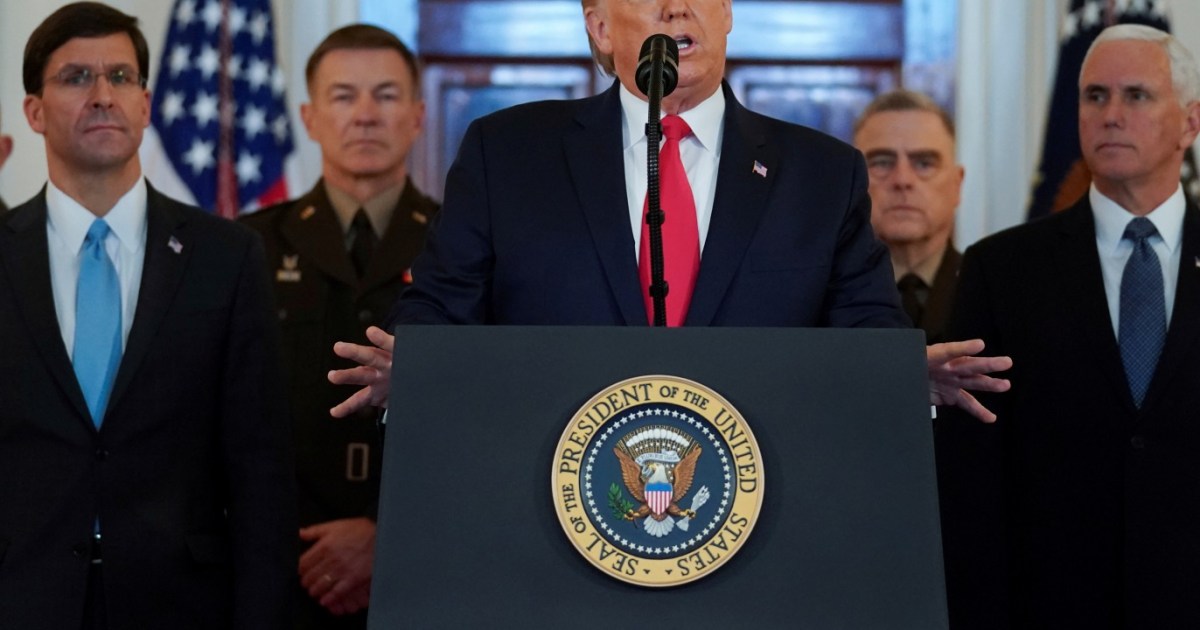Dangerous tension hangs over US President Donald Trump's relationship with the military, after Defense Secretary Mark Esper rejected the president's call to deploy the military to control protests against the killing of George Floyd, an African American, more than a week ago, while criticizing former prominent figures in the Pentagon - including one Former defense Jim Mattis - Trump's handling of demonstrations.
And Esper's announcement last Wednesday against his deployment of soldiers on duty to control anti-police protests over the use of force constituted an exceptional confrontation with the supreme commander of the country's armed forces.
"I do not support resorting to the law of the uprising," Esber said, referring to a law issued in 1807 that Trump sought to activate with the aim of deploying armed soldiers from the army to take control of the cities in protest.
Hours later, Jim Mattis - the predecessor of Esper - launched an attack on Trump, writing, "When I joined the army about 50 years ago, I swore to support and defend the constitution ... I never imagined that soldiers who took the oath themselves could receive the order - whatever the circumstances. - To violate the constitutional rights of their citizens, "referring to the right to demonstrate.
Mattis, who served as Trump's defense minister for two years before resigning after disagreements with the president, noted that the Nazis in Germany believed in the slogan "divide and rule."
He said, "Donald Trump is the first president in my life not to try to unite Americans, but he doesn't even pretend that he's trying to do that." "Instead, he is trying to divide us."
Political goals
Two former chiefs of staff of the Joint Chiefs of Staff (currently holding personalities who have served under them at the highest levels of the Pentagon) have entered the contest line.
"America is not a battlefield ... Our citizens are not enemies," said retired general Martin Dempsey, who was chief of the General Staff between 2011 and 2015.
In turn, his predecessor, retired Admiral Mike Mullen, wrote, "I am deeply concerned that our army personnel will be re-employed while they are given orders for political ends."
The apparent opposition of the president to non-political personalities has reinforced the risk of a rift in civil and military relations, and this could also mean that the Esber position is at stake.
White House spokeswoman Kylie McKinney declined to respond to the question of whether Esper still had full Trump confidence.
These developments actually shake the image that Trump has repeatedly insisted on regarding his alliance with the military, which is promoted in his political propaganda as an indication of his hardness.
Signs of resistance have appeared against Trump since last week when he threatened to send regular armed forces, instead of merely reservists from the National Guard, to stop the protests that followed Floyd's death while he was being arrested by police in Minneapolis, Minnesota.
Esper appeared to agree with the president when he ordered that 1,600 military police be sent to the Washington area to prepare if the riots increased, before calling on state governors to "take control of the battlefield."
The politicization of the army
When Esper and Chairman of the Joint Chiefs of Staff Mark Millie appeared next to Trump on Monday to take memorial photos at a church near the White House, minutes after the security forces cleared the area of the protesters, they seemed to agree with Trump's desire to deploy the soldiers.
But the US Secretary of Defense retracted his position on the accusations that he was turning the military into a political tool in Trump's hands, firmly asserting on Wednesday his opposition to using soldiers on duty to deal with the protesters.
"The use of soldiers on duty should be the last resort, and only in more serious cases," Esber told reporters at the Pentagon. "We are not in a situation like this at the moment," he added.
In an effort to clarify their positions, Esber, Millie, and other senior Pentagon officials assured the soldiers that they had sworn to defend the US constitution, especially the right to freedom of expression.
A former Pentagon spokesman, David Laban, said he had never seen an anti-President stance so much, especially by a figure in Mattis' shrine.
"The president politicized the army in unprecedented ways," Laban from the "two-party policy" institute told AFP. He added that Esber and Milli "were very late and allowed the situation to get worse."
He continued, "During this week, they lost some confidence from the forces and the American people" together. He stressed that Matisse, Dempsey and Mullen were not trying to feed an insurgency within the ranks of the army, but they considered that the reputation of the military among the American people is at stake, noting that the situation "was exacerbating."

